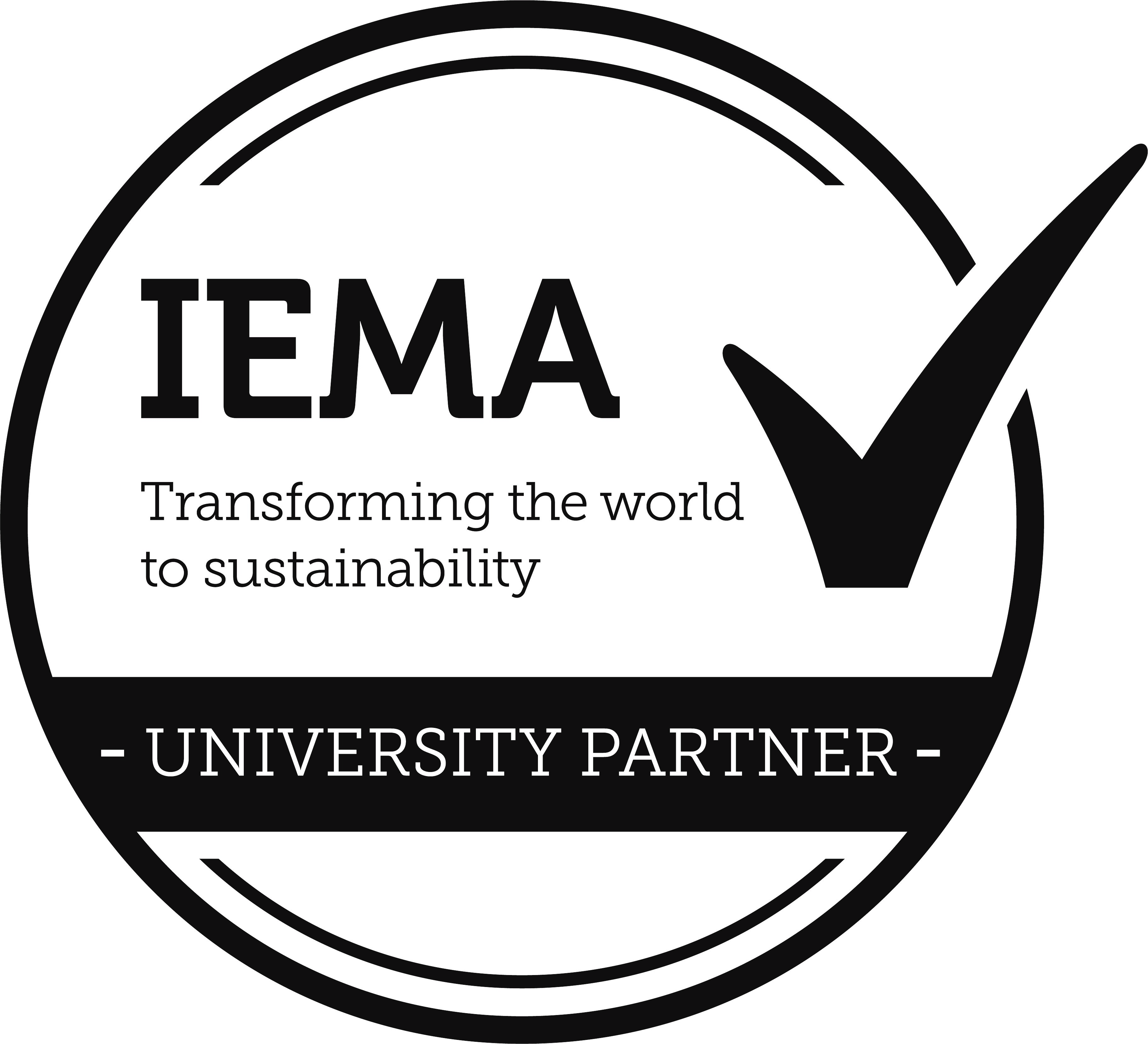Postgraduate Scholarship Skills
Environmental Assessment and Management
School of Science, Engineering and Environment
Full-time
Part-time
One year
Three year
September 2024
In a nutshell
Study the relationships between human and natural components of the environment, and develop the capacity to implement measures for analysing and managing environmental impacts of organisations, with our MSc Environmental Assessment and Management postgraduate degree.
Designed to prepare you for career roles leading the formulation, implementation and evaluation of environmental policy initiatives within the environmental sectors, this course will help you to develop the core knowledge and skills needed by environmental management, regulation or consultancy professionals.
The course is accredited by Institute of Environmental Management and Assessment (IEMA). If you successfully complete the course, you will automatically qualify for GradIEMA professional status. You can also fast track to PIEMA (Practitioner Status) once you complete a work-based competence assessment.
International applicant? Please check international intakes for the latest information and application dates.
Start your MSc Environmental Assessment and Management study journey
Register for our next Open Day where you can learn more about the course, tour our impressive campus and meet the tutors
You will:
- Learn about existing and emerging challenges and explore contemporary management, technological and regulatory systems designed to reduce environmental risks
- Study the areas of law, economics and the social and physical sciences which are of relevance to the theory and practice of environmental assessment and management
- Learn authentic, experimental problem-based learning
students accepted
Course accreditations

This is for you if...
You are currently working in environmental management and looking to develop your professional skills
You are interested to move into the environmental industry
You are wanting to develop your practical skills
All about the course
Course delivery
Our MSc Environmental Assessment and Management postgraduate course is delivered through a range of industry-focused modules. The 180-credit MSc award comprises six credit-bearing taught modules, plus a 60-credit research-based dissertation project.
The course is open for entry each January and September. Flexibility is at the heart of our learning approach. You can choose to study this postgraduate course full-time or part-time on campus:
- As a full-time student, you will complete six credit-bearing taught modules totalling 120 points across the trimesters one and two on campus. You will complete a 60-credit research-based dissertation during your third trimester
- As a part-time student, you will complete six credit-bearing modules totalling 120 points across five trimesters spread over two years. Across a third year of study, you will complete a 60-credit research-based dissertation project
Learning experience
During your studies, you will engage with issues drawn from law, economics and the social and physical sciences which are relevant to the theory and practice of environmental assessment and management. You will also look at existing and emerging challenges, and explore contemporary management, technological and regulatory systems that are designed to reduce environmental risks.
The course has a highly-practical focus with an emphasis on authentic, experimental problem-based learning. You will consider the relevant concepts in practice and apply them in different circumstances, helping you to develop confidence in managing rapid social, technological and organisational change.
Modules content is designed to provide the knowledge you will need to apply for entry to the Institute of Environmental Management and Assessment (IEMA). The dissertation element will develop your existing research skills so you can participate in meaningful applied research in the field of environmental assessment management.
Learn more about the current course modules in the section below.
Read about Eleanor's experience studying MSc Environmental Assessment and Management
Course team
The Environmental Assessment and Management postgraduate course is delivered by an academic team with exceptional research experience and extensive professional connections.
Course leader: Carole Conroy
This module provides key skills and knowledge to pursue academic research at the postgraduate and professional level, looking at big issues in environmental sciences. The module also introduces ethics and bioethics and will aim to enhance students critical thinking.
Standards and Auditing
This module examines the relevance and relative merits of the different tools and approaches available to the business community in assessing and improving its health, safety, and environmental performance and addressing the sustainability agenda. You will explore through case study and field work the of the business community to the internal and external drivers of health, safety and environmental performance and corporate social responsibility. You will be trained to undertake audits and will have the opportunity to undertake audits of business processes through collaboration with business partners.
Choose two options from
Environmental Pollution and Remediation
This module covers the toxic characteristics of major environmental pollutants (heavy metals/metalloids, petroleum hydrocarbons, pesticides, nitrogen, phosphorus etc.), and their chemical behaviour, transport and environmental fate in various environmental compartments, including air, water and soils. Remediation technologies for key environmental pollution problems such as acid rain, smog, acid mine drainage, contaminated lands, eutrophication, greenhouse gas emission etc. are introduced.
Energy Sustainability
This module provide an insight into and critical awareness of environmental, technical, economic and political factors influencing policies and mechanisms for the sustainable management of energy and environmental resources. It will enhance the skills required to formulate strategies for reconciling conflicts between development and environmental protection in the context of energy and resources management.
Resource Security
This module explores the complex field of resource security, from energy to food and beyond. With rising populations and cities expanding, resource management is more vital than ever. You will explore resource security through an interdiscplinary lens, touching on fields including planning, environmental, soil science and beyond, in an attempt to understand the complex nature of the topic.
Professional Practice
This module aims to enable you to design, plan and execute a programme of research through active enquiry and to undertake appropriate analysis of research results. You will have the opportunity to use research skills acquired in the applied context of real world project work in a variety professional settings and to develop the skills necessary for successful delivery of project outcomes. You will work as part of a team with an external organisation or company relevant to your degree discipline on a project defined by a client. The module provides you with opportunities to develop range of skills and aptitudes including negotiation of project terms of reference, research design, data collection and analysis, professional communication, project management and professional networking.
Research Design and Delivery
This module will prepare you for your dissertation by enabling you to design, plan and execute a programme of research and to analyse research results appropriately. It will provide opportunities for you to acquire essential research skills relevant to your discipline in both a field and laboratory setting. The experience in applying these skills will be invaluable in planning and undertaking your dissertation.
Environmental Impact Assessment
This module examines and evaluates processes for investigating and mitigating the impacts of development in the context of environmental impact assessment and planning procedures. You will explore impact assessment policy, law and practice through case study research and practical applications in the field. You will have the opportunity to interact with environmental impact assessment professionals in developing and presenting a case study providing you with valuable insights into career prospects in this field.
Risk Regulation
This module examines risk based approaches to regulation. You will explore the role of law in the management of health, safety environment including the current English criminal law, the influence of social legislation and other EU and international influences. You will study the operation of the major statutes in the field, their interpretation and application, procedures and protocols for the collection of admissible evidence; regulatory authorities, criminal / administrative sanctions and sentencing guidelines.
Dissertation
This dissertation aims to contribute to the body of knowledge in your area by devising and conducting an independent research project and through independent, self-motivated critical thinking, to develop as a reflective practitioner.
Please note that it may not be possible to deliver the full list of options every year as this will depend on factors such as how many students choose a particular option. Exact modules may also vary in order to keep content current. When accepting your offer of a place to study on this programme, you should be aware that not all optional modules will be running each year. Your tutor will be able to advise you as to the available options on or before the start of the programme. Whilst the University tries to ensure that you are able to undertake your preferred options, it cannot guarantee this.
School of Science, Engineering and Environment
Rising to the challenge of a changing world, our postgraduate courses are designed to shape the next generation of urbanists, scientists, engineers, consultants and industry leaders.
Shaped by industry, and delivered by supportive programme teams, you can develop the skills to take your career potential further.
Industry collaboration and research
When you start this degree course with Salford, you are joining a community making a difference in industry, our local region and in our wider society.
Many of our academics and technicians who support your course also lead collaborative, interdisciplinary, high-impact work in a range of local and global environmental issues and challenges.
Discover how you are part of something bigger.
What about after uni?
EMPLOYMENT
Environmental management is a growing career field. By equipping you with relevant knowledge and skills, our course can open up excellent employment opportunities in positions working as environmental managers and environmental regulators. The course can also prepare you for roles environmental consultancy that focus on issues such as contaminated land, planning and environmental impact assessment, environmental management in organisations, and waste, water and energy management.
Today, you will find course alumni working in energy companies at the forefront of environmental innovation (e.g. Uniper and EDF Energy), national and local environmental regulators (e.g. the Environment Agency and local authorities), environmental consultancies with an international dimension (e.g. Royal Haskoning, Scott Wilson, WS Atkins, Mouchel) and utilities companies (e.g. United Utilities, Viridor-Laing).
FURTHER STUDY
You might also choose to take your subject interest further with postgraduate research. Our Ecosystems and Environment Research Centre is home to PhD and Research Master’s opportunities exploring a range of topics, from energy and food security to ecosystem services and environmental assessment.
Explore our Doctoral School to learn more about research training, support and opportunities.
Career Links
- Our course will develop your professional skills through practice-based learning opportunities, such as project work with external clients or a specific business problem for your dissertation. Recent projects include an analysis of the air quality benefits of trees in urban areas, analysis of energy management measures in schools and the assessment of environmental management options for a national charity.
- Our course team has links with volunteering organisations including the Royal Society for the Protection of Birds, the Groundwork organisations and the Bolton Community Development Partnership. Where possible, we encourage you to carry out voluntary work with these and other organisations as this can provide invaluable subject insight.
- As a full-time student, you may choose to work with a business on an environmental management project as part of your dissertation. Past projects working with E.ON UK, United Utilities, Groundwork and Manchester City Council, have looked at contaminated land investigation, feasibility studies of sustainable technologies and stakeholder perceptions of sustainable environmental practices.
What you need to know
APPLICANT PROFILE
The course is recommended for applicants looking to become environmental practitioners (i.e. managers, advisors and regulators) who can confidently apply interdisciplinary methodologies and strategies to assess and manage risks to health and the environment.
ENGLISH LANGUAGE REQUIREMENTS
All of our courses are taught and assessed in English. If English is not your first language, you must meet our minimum English language entry requirements. An IELTS score of 6.0 (no element below 5.5) is proof of this, however we do accept a range of equivalent qualifications.
Read more about our English language requirements, including information about pathways that can help you gain entry on to our degree courses. If you do not have the English language requirements, you could take our Pre-Sessional English course.
INTERNATIONAL APPLICATIONS
Please check international intakes for the latest information and application dates.
COURSE ACCREDITATION
The course is accredited by Institute of Environmental Management and Assessment (IEMA). Students who successfully complete the course will automatically qualify for GradIEMA professional status. Graduates can also fast track to PIEMA (Practitioner Status) once they complete a work-based competence assessment.
Undergraduate degree
Applicants require at least a UK lower second class honours degree (2:2) or equivalent in any subject.
International student entry requirements
We accept qualifications from all around the world. Find your country to see a full list of entry requirements.
Accreditation of Prior Learning (APL)
We welcome applications from students who may not have formal/traditional entry criteria but who have relevant experience or the ability to pursue the course successfully.
The Accreditation of Prior Learning (APL) process could help you to make your work and life experience count. The APL process can be used for entry onto courses or to give you exemptions from parts of your course.
Two forms of APL may be used for entry: the Accreditation of Prior Certificated Learning (APCL) or the Accreditation of Prior Experiential Learning (APEL).
For more information or enquires about this scheme, please contact: AdmissionsSEE-PGT@salford.ac.uk
How much?
| Type of study | Year | Fees |
|---|---|---|
| Full-time home | 2024/25 | £9,990.00per year |
| Full-time international | 2024/25 | £16,380.00per year |
| Part-time | 2024/25 | £1,665 per 30 credits |
Additional costs
You should consider further costs which may include books, stationery, printing, binding and general subsistence on trips and visits.
International student scholarships
If you are a high-achieving international student, you may be eligible for one of our scholarships. Learn more about our latest international scholarships.


